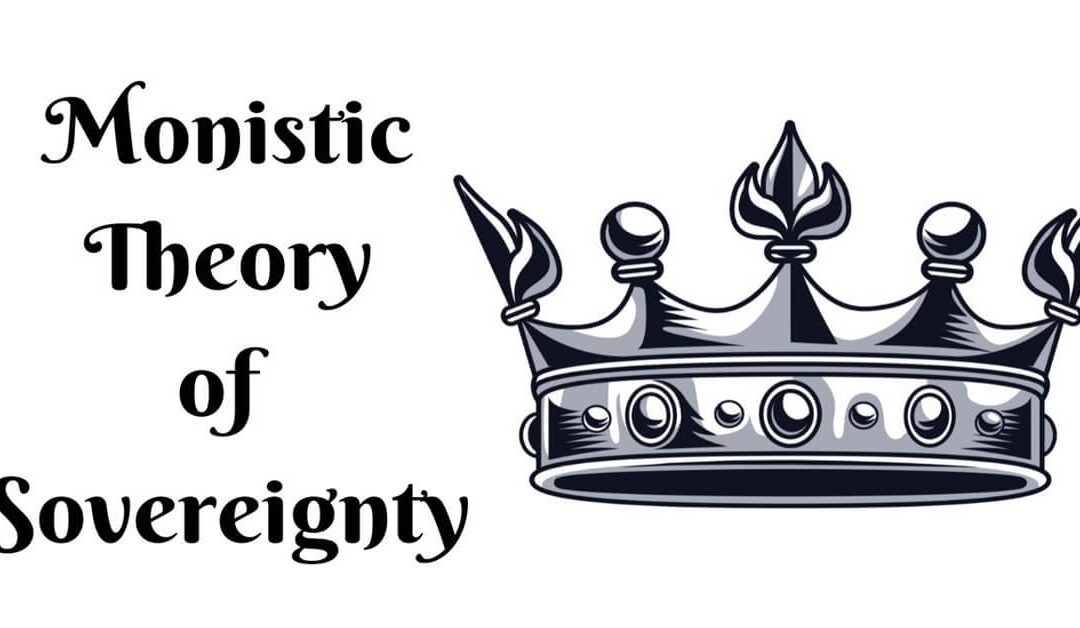Introduction:
Sovereignty has long been a cornerstone of political theory, with many scholars offering varied perspectives on its nature. The Monistic Theory of Sovereignty is one such prominent viewpoint, rooted in the belief that sovereignty is indivisible and concentrated solely within the state. While this theory has garnered significant attention over time, it is important to recognize the contrasting views put forth by other scholars who argue that sovereignty is not limited to the state alone but extends to various institutions within society.
Historical Background of Monistic Sovereignty
The Monistic Theory, also referred to as the Traditional or Legal Supremacy Theory of Sovereignty, has been primarily championed by renowned political philosophers such as Jean Bodin, Hugo Grotius, Thomas Hobbes, John Locke, Jean-Jacques Rousseau, Jeremy Bentham, and most notably, John Austin. These thinkers emphasized that sovereignty is a unique power held exclusively by the state, and no other entity possesses this supreme authority. In contrast, scholars like H. J. Laski, G.D.H. Cole, Ernest Barker, and others argued against this idea, suggesting that sovereignty is not the exclusive domain of the state but is shared among various institutions.
John Austin’s perspective on sovereignty is particularly influential and has led to the Monistic Theory being associated with his name. His scientific analysis of sovereignty, presented in his seminal work Lectures on Jurisprudence in 1832, laid the foundation for a legalistic understanding of state power. Austin defined sovereignty as the supreme, undivided power of the state, a notion that has since become central to this theory.
Austin’s Scientific Analysis of Sovereignty
John Austin, a legal philosopher from England (1790–1859), is widely credited with providing a systematic and scientific analysis of sovereignty. Initially, Austin had a career in the military before becoming a lawyer and later dedicating himself to legal theory. Influenced by the works of Thomas Hobbes and Jeremy Bentham, Austin developed his theory of sovereignty by meticulously analyzing the nature of state power.
In his 1832 Lectures on Jurisprudence, Austin famously stated that “sovereignty is the command of a great man to a lowly man.” He argued that sovereignty is vested in a specific entity or individual within a political society who holds the ultimate authority and commands obedience from the majority of the population. This entity, according to Austin, is not subject to any external power or equal authority. Essentially, Austin believed that sovereignty is concentrated in one supreme ruler or governing body, which possesses absolute power over the society it governs.
Austin further argued that for a society to be politically independent, it must have a sovereign who is recognized as the highest authority, to whom the people owe allegiance. He emphasized that sovereignty is defined by the obedience of the majority of the population to this central authority, making it the foundation of a stable political society.
Contrasting Views on Sovereignty
While Austin’s Monistic Theory of Sovereignty gained prominence, other political thinkers offered differing views. For instance, Jean Bodin, an earlier proponent of monistic sovereignty, argued that the state should not be subject to external control, and its power should be absolute. However, Thomas Hobbes, another influential figure, warned that unchecked sovereignty could lead to despotism.
John Locke, on the other hand, contended that sovereignty resides in the people, and the government’s power is derived from the consent of the governed. In contrast to Hobbes and Austin’s notions of absolute sovereignty, Locke’s theory of popular sovereignty suggested that the people themselves are the ultimate source of political authority. Similarly, Jean-Jacques Rousseau maintained that sovereignty is expressed through the general will of the people, collectively represented in a governing assembly.
These contrasting views highlight the complexity and diversity of thought surrounding the concept of sovereignty. While some argue for a concentrated and absolute form of state authority, others advocate for a more democratic and dispersed understanding of sovereignty that involves the participation of the people and other institutions.
Relevance of Monistic Sovereignty in Modern Political Thought
The Monistic Theory of Sovereignty, particularly as articulated by John Austin, has played a significant role in shaping modern legal and political thought. Austin’s legalistic approach has influenced the development of constitutional law, international relations, and state governance. However, the theory has also faced criticism for its rigid and absolutist nature, which can potentially ignore the importance of democratic institutions and individual rights.
In contemporary political discourse, the debate surrounding the nature of sovereignty continues, with some arguing that the state’s sovereignty is increasingly challenged by globalization, international law, and transnational organizations. Nonetheless, Austin’s contribution to the scientific analysis of sovereignty remains a foundational aspect of political theory, providing valuable insights into the legal and structural frameworks of state power.
Conclusion
The Monistic Theory of Sovereignty offers a unique perspective on the concentration of power within the state. While it has been widely accepted and influential, it also faces challenges from pluralistic and democratic interpretations of sovereignty that recognize the role of the people and other institutions in the exercise of political authority. The ongoing dialogue between these differing views continues to shape our understanding of sovereignty in the modern world.

